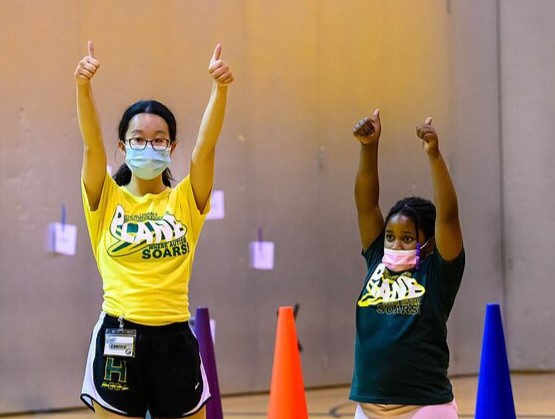
PLANE activity session
Over time, consistent physical activity can support improved cardiovascular and muscle fitness, enhanced mental health, and increased capacity to perform daily tasks for people with disabilities, while shaping a positive self-perception and challenging societal stigmas surrounding disabilities.
To reach these benefits, people with disabilities must often work through environmental barriers, pain, physical limitations, and negative perceptions toward exercise to pursue recreation, enjoy movement, and improve their overall health. At the Health Fund, we believe all members of our communities should have equitable access to the opportunities for health, connection, and physical well-being provided through activity and exercise.
That’s why over the last four years, our Nutrition and Healthy Lifestyles program has invested in innovative projects to create opportunities for people with disabilities to engage in physical activity, and many are participating. Here are a few examples:
INCLUSIVE NUTRITION AND FITNESS FOR CHILDREN
Wayne State University
Physical Literacy and Nutrition Education Program (PLANE)
PLANE aims to enhance health equity and tackle accessibility challenges for children with Autism Spectrum Disorder (ASD) and their families in and around Detroit. The Health Fund’s initial support helped launch a year-round program at Wayne State to increase physical activity participation, improve nutrition behaviors, and promote greater engagement in social services for children with ASD and their families.
Participating children and families are guided through a curriculum that introduces new physical activities and healthy recipes each week, and participants receive direct, individualized support to integrate exercise sessions and nutrition into their lives.
In 2023, the Health Fund made a second grant to support the program’s expansion, which involves an implementation assessment to guide replication in more communities in Metro Detroit and delivery of programs in additional accessible settings, like schools and community centers.
“This program has proven effective at promoting positive trajectories of health for children with autism, as well as their caregivers, playing a pivotal role in reducing barriers to accessible health programs in Detroit,” said Dr. Leah Ketcheson, the program’s principal investigator. “PLANE now represents a sustainable health promotion program specifically designed to serve an often overlooked and underserved population.”
PLANE has produced a number of encouraging results: the majority of families enrolled have experienced positive outcomes as a result of consistent participation. Specifically, children have experienced improvements in physical activity engagement, enhanced sports skills, and increased social confidence. Simultaneously, the majority of caregivers have experienced a significant improvement in weight status, and decreased levels of anxiety and depression.
P.E. CLASSES ADAPTED FOR ALL
Disability Network Washtenaw Monroe Livingston (formerly Ann Arbor Center for Independent Living)
Michigan Adaptive Sports and Inclusive Recreation Initiative
In 2021, the Health Fund made a grant aimed at improving access to physical activity opportunities for students by increasing awareness and knowledge of adaptive sports and inclusive recreation. These activities include modifications to make them accessible to all people, with or without disabilities.
Grant funding enabled the University of Michigan’s Adaptive Sports and Fitness Program to implement an evidence-based physical education curriculum — Adaptive Sports and Inclusive Recreation Initiative (ASIRI) — across all sixth-grade classes within Ann Arbor Public Schools (AAPS).
Michigan currently lacks consistent physical education standards to ensure equal access to physical activity for youth with disabilities, and the curriculum was developed and deployed to ensure that all kids, regardless of ability, can participate in a school-related physical activity through training, intervention, and adaptable activities.
The results showed that students overall experienced an increase in physical activity behaviors, as well as enhanced awareness, knowledge, access, and participation related to adaptive sports.
“The initial launch, implementation, and integration of ASIRI in Ann Arbor Public Schools was a great success with the support from the community partners involved in the initiative,” said Dr. Okanlami Oluwaferanmi — known as “Dr. O.” — Director of Adaptive Sports and Fitness in the University of Michigan’s Division of Student Life and the project leader.
“The results support us in our mission to promote to our community, and across the country, that disability is not inability.”
The initiative’s success has resulted in grant funding from Community Health Services to support its expansion to all middle school grades in Ann Arbor and Ypsilanti, while program leaders have helped to launch similar programs in communities across the United States.
FUTURE INVESTMENT IN ACCESSIBILITY
We remain committed to the well-being and social integration of individuals with disabilities, with a focus on fostering enduring positive impacts at both the individual and community levels.
Through our 2024 Nutrition and Health Lifestyles Initiative, we’ll be seeking to fund projects that remove environmental and social barriers impeding full inclusion in recreation and fitness activities for people with disabilities. We’re also looking for projects that enhance their overall health, increase levels of self-efficacy, and promote greater community inclusion for this population.
Our upcoming grant round opens in March. Stay informed by subscribing to our newsletter. You can also follow us on LinkedIn, Facebook, and Twitter for all the latest Health Fund news.
Have questions? We are here to engage with you and discuss your ideas before applying for funding. Contact Dr. Tayo Moss by email at [email protected] or by phone at (734) 552-9294 to start the conversation.
